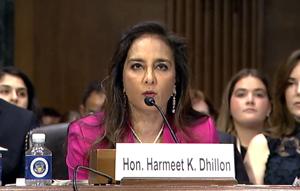Business leaders eye immigration reform
A majority of Americans are calling for increased legal pathways for immigrants to work in and live in the United States across various job sectors, according to a new poll commissioned by The Center Square.
Ninety-four percent of Americans said it was at least “somewhat important” to increase legal pathways for doctors and nurses to live and work in the United States, for example. Eighty-seven percent said the same about seasonal farm workers and 54% agreed when referring to construction workers.
Jeff Wasden, the president of the business association State Business Executives, said the opinion trends in the American public on legal immigration have existed for a long time.
“It should not take countless attorneys, countless dollars, and dozens of years to try to go through a legal immigration process,” Wasden said.
Wasden said the government needs to provide more certainty in the visa process for entrepreneurs and high-skilled workers that come to the United States.
According to the polling, conducted by RMG Research in conjunction with Napolitan News Service, 74% of Americans said it was at least somewhat important to have legal pathways for immigrants pursuing entrepreneurial careers.
“We want to expand state and business sponsored visas to help with the backlogs and drive work there,” Wasden said.
Since 2007, 16 states have introduced bills or proposals to recruit additional migrant workers, according to the Bipartisan Policy Institute. Both red states and blue states – Colorado, Georgia, Massachusetts and Utah – passed laws or resolutions to recruit more workers.
Wasden said many business leaders are frustrated with the visa caps that are set by the government and put on job sectors or against certain countries.
“Somebody arbitrarily created a number, you know, X number of years ago, and there’s no more visas there to be able to fill jobs that is very problematic to business growth,” Wasden said.
Congress sets an annual cap for certain visas each year. In 2025, the cap for H1-B visas, a type of speciality worker visa, is set at 65,000.
Wasden added that businesses are looking for ways to increase opportunities for migrants to come through legal pathways in the work he or she does. He said the Trump administration has done well in securing the border and now needs to focus its efforts on expanding legal pathway availability.
“This administration has an opportunity now to step in and actually do something historic that hasn’t been done before,” Wasden said about efforts to expand the workforce through immigration.
Wasden pointed to the poll of American voters as a sign of how widespread the sentiment of increased legal pathways to immigration is for the United States. He said legislators see these sentiments in voters and are attempting to address them with legislation.
Wasden highlighted the Dignity Act, introduced in July by Reps. Maria Salvazar, R-Fla., and Veronica Escobar, D-Texas. The act aims to create a seven year merit-based legal status program.
“The electorate has always agreed that we need immigration reform,” Wasden said. “This administration should do something about it and seize that opportunity and try to fix some of these things.”
Latest News Stories

DOJ settles race-based admissions with military academies

More California voters are liking Trump’s job performance

U.S. national debt tops $37 trillion

Illinois quick hits: Human trafficking law signed; Mercyhealth to pay for COVID vaccine discrimination

Justice Department finds GWU in violation of Title VI

WATCH: Nearly 400 people become U.S. citizens at Illinois State Fair

Appeals court says Trump can move forward with foreign aid cuts

WATCH: Governor suggests ending nuclear ban as lawmaker files pro-nuclear bill

Kratom byproduct in gummies, candies, ice cream ruled same as herion, LSD

‘Liberation Day’ reignites D.C. statehood debate

Trump to meet with Democratic leaders to discuss govt funding bills

WATCH: Illinois Democrats blast Trump, Republicans at state fair

Social Security’s 90th anniversary sparks debate over how to address insolvency

Colorado ranks eighth nationally for battling antisemitism






